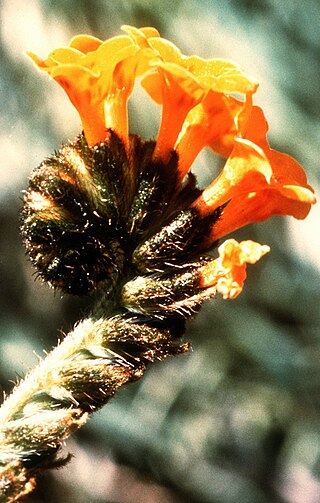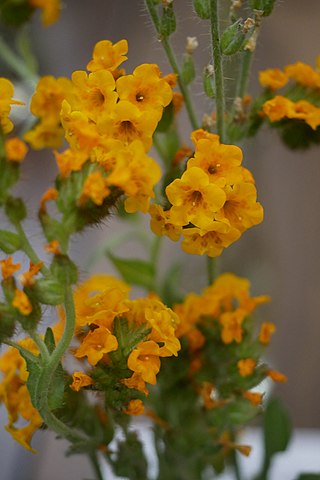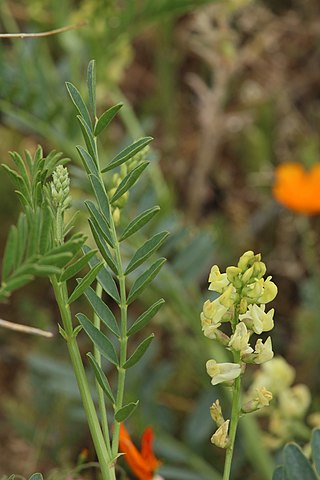
Nemophila menziesii, known commonly as baby blue eyes or baby's-blue-eyes, is an annual herb, native to western North America.

Amsinckia is a genus of flowering plants commonly known as fiddlenecks. The common name is derived from the flower stems, which curl over at the top in a manner reminiscent of the head of a fiddle. Fiddlenecks are in the family Boraginaceae, along with borage and forget-me-nots. The genus is named after the patrician Amsinck family in honour of the Hamburg head of state and patron of botany Wilhelm Amsinck (1752–1831).

Phacelia fremontii is a flowering plant in the family Boraginaceae native to the southwestern United States. In California, its range includes the Mojave Desert, the San Joaquin Valley, the Coast Ranges, and the Sierra Nevada. It was named for John C. Frémont.

Coreopsis bigelovii is a species of flowering plant in the daisy or sunflower family, Asteraceae, with the common names Bigelow coreopsis and Bigelow's tickseed. It is endemic to California.

Amsinckia grandiflora is a species of fiddleneck known by the common name large-flowered fiddleneck. This is a wildflower endemic to California and considered a Critically endangered species on the state and national level. Amsinckia grandiflora is one of four 1248 rare heterostylous species within the genus Amsinckia that have highly restricted distributions from which the more weedy homostylous congeners are thought to have evolved.

Amsinckia menziesii is a species of plant in the family Boraginaceae, the borage or forget-me-not family.

Amsinckia douglasiana is an uncommon species of fiddleneck known by the common name Douglas' fiddleneck. It is endemic to the coastal Santa Monica Mountains and Santa Ynez Mountains of southern California.

Amsinckia eastwoodiae is a species of fiddleneck known by the common name Eastwood's fiddleneck. It is endemic to California, where it grows in the varied plant habitat of the hills, mountains, valleys, and coastlines.
Amsinckia lunaris is an uncommon species of fiddleneck known by the common name bent-flowered fiddleneck. It is endemic to California, where it grows in the San Francisco Bay Area, the woods of the coastal and inland mountains just north, and the Central Valley and its San Joaquin Valley.

Amsinckia lycopsoides is a species of fiddleneck known by the common name tarweed fiddleneck or bugloss fiddleneck. It is one of the more common species of fiddleneck. It is native to much of western North America from California to British Columbia. It can be found in a wide variety of areas.

Amsinckia spectabilis is a species of fiddleneck known by the common names seaside fiddleneck and woolly breeches. It is native to the west coast of North America from British Columbia to Baja California, where it grows in sandy habitat, including direct coastline.

Anemonoides oregana is a species of flowering plant in the buttercup family known by the common names blue windflower, Oregon anemone, and western wood anemone. It is native to the forests of Washington, Oregon, and northern California in western North America, generally below 7,000 feet (2,100 m) elevation.

Astragalus douglasii is a species of milkvetch known by the common name Douglas's milkvetch. It is native to California and Baja California, where it can be found in many types of desert, valley, chaparral and woodlands, and montane habitats, usually below 8,000 feet (2,400 m) elevation.

Chaenactis glabriuscula, with the common name yellow pincushion, is a species of flowering plant in the daisy family. It is native to California and Baja California.

Encelia actoni, also known by the common names Acton brittlebush and Acton encelia, is a species of flowering plant in the family Asteraceae.

Malacothrix californica is a species of flowering plant in the family Asteraceae known by the common name California desertdandelion. It is native to California, the western margin of Arizona and Baja California, where it may be found especially in the South Coast, Transverse and Peninsular Ranges and the western Mojave Desert.

Mentzelia veatchiana is a species of flowering plant in the family Loasaceae known by the common name Veatch's blazingstar.

Phacelia tanacetifolia is a species of flowering plant in the borage family Boraginaceae, known by the common names lacy phacelia, blue tansy, purple tansy or fiddleneck(UK).

Pholistoma membranaceum is a species of flowering plant in the borage family which is known by the common name white fiesta flower.
Amsinckia carinata is a species of flowering plant in the borage family known by the common name Malheur Valley fiddleneck. It is endemic to Oregon, where it is known only from Malheur County.


















